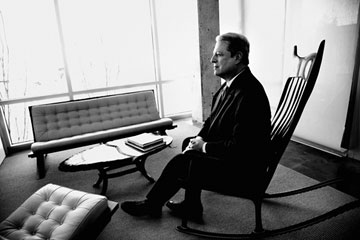
(2 of 4)
That check landed close behind Gore's estimated $100 million profit on the sale of Current TV to al-Jazeera, a deal in the waning hours of 2012 that sent Gore bashers into orbit. His critics were correct when they charged that Gore was more adept at cajoling cable operators to include Current TV in their lineups than he was at creating watchable programs during almost a decade as one of the channel's co-owners. Clearly, the Qatar-based al-Jazeera news network paid top dollar for access to those cable systems, which it had failed to obtain on its own. But Gore is hardly the first person to get rich by wheedling a spot on basic cable. Just click your way through that wasteland and you'll see: every niche audience seems to have been leveraged by someone peddling a ho-hum channel.
Gore is also a co-founder, along with former Goldman Sachs executive David Blood, of Generation Investment Management, a private partnership that pursues what Gore calls sustainable capitalism. His belief is that companies prosper over the long haul if they pay attention to values beyond the quarterly earnings report. Analyzing investments with this in mind, Generation hopes to vindicate that philosophy with strong returns on the more than $3.5 billion that it manages (according to the website Stockpickr). Results at the private firm aren't publicly disclosed, but analysts say the jury is still out.
Through these and other enterprises, Gore has built his net worth from roughly $2 million in 2000, when he reluctantly entered the private sector, to some $300 million, according to the scorekeepers at Forbes. By their measure, he is now richer than the renowned supercapitalist Mitt Romney.
So Gore has more inside knowledge than the average futurist about both politics and business, the subjects inextricably linked at the heart of The Future. I met him for an interview at his LEED platinum-certified office in Nashville, a spare layout with concrete floors and touches of paneling made of lumber reclaimed from the bottom of the Tennessee River. Explaining his book, Gore begins with this premise, which seems beyond dispute: "One of the striking characteristics of our time is we have multiple revolutionary, historic changes under way simultaneously." The rapid development of transnational businesses able to move costs and profits easily from country to country, outsourcing and even robosourcing labor--replacing workers with robots--adds up to an economic revolution, which Gore dubs "Earth Inc." The still dawning digital age, with its promise and perils, is a revolution in communications and human interaction. Gore calls this "the Global Mind." A revolution in biology, from genetic engineering to organ farming and even cloning, is nothing less, in Gore's view, than "the reinvention of life and death." Meanwhile, climate change demands an energy revolution.
